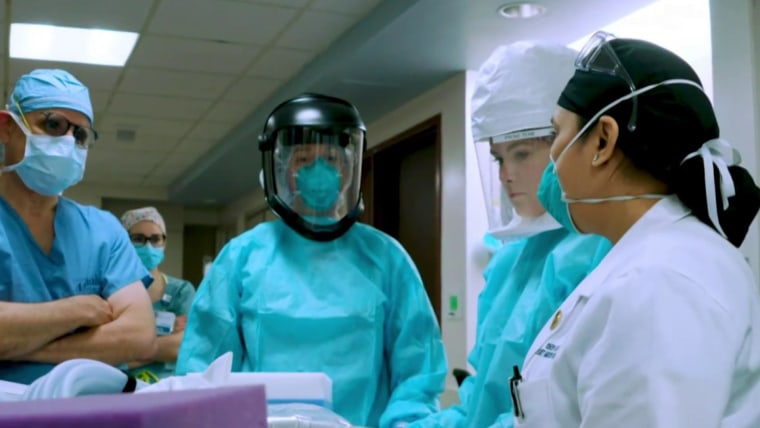Nguyen’s case is one example cited in the union’s complaint against Fountain Valley. Another relates to a radiology aide whose immediate family members contracted the coronavirus.
On June 16, the radiology aide says, he told management about his exposure to his ill relatives. According to the union, the hospital told him to continue working as usual, interacting with co-workers and transporting patients around the facility.
Nine days later, he tested positive for COVID-19 and was admitted to the hospital, according to the complaint the union filed with the state. He had potentially exposed an unknown number of patients and other employees to the coronavirus, the complaint states, but the hospital didn’t do comprehensive contact tracing.
The radiology aide’s colleagues learned of his coronavirus infection when they saw him being admitted to the emergency room, said Joshua Jesus, a radiology technician, who worked with the aide. The hospital’s management and human resources offices haven’t explained their contact tracing policies, Jesus said.
Fountain Valley said it has had ongoing conversations with the union about employee concerns, and that it follows CDC guidelines to notify staff members about exposures “if they did not wear their PPE appropriately and had prolonged close contact” with a patient.
Download the NBC News app for full coverage and alerts about the coronavirus outbreak
Contact tracing is a labor-intensive ordeal in hospitals that can have three dozen departments, and that’s just one of several barriers to the safety measures unions have demanded. The limited availability of protective equipment has made it necessary to lock up supplies so hospitals don’t run out of them. And hospital executives say they have only a limited capacity to process coronavirus tests in-house, so many prioritize patients over staff members who have been exposed but aren’t showing symptoms.
“With some of the issues hospitals are facing, they may decide it might be better to let someone quarantine at home and assume they have it,” said Mark Brown, chief nursing officer at Good Samaritan Hospital in San Jose, which offers tests to all employees who want them.
Other hospitals in the San Francisco Bay Area have also tested their workers. The Stanford Medical Center in Palo Alto tested about 17,000 employees from March to May and has performed 13,000 additional tests on workers in the summer. The County of Santa Clara Health System performed over 10,000 tests of employees from three public hospitals from late April to mid July to catch asymptomatic carriers.
But those are outliers in the state.
Part of the problem, said Dr. Jahan Fahimi, an emergency care physician at the University of California, San Francisco Medical Center, is that there’s no national testing strategy.
“And as a result,” Fahimi said, “every county, every health system has been left to come up with their own strategy. That has a few downsides — one being that you have to make tough decisions about allocations of what becomes a scarce resource. In an ideal world, we’d be doing surveillance testing on an ongoing basis — a rotating schedule for all health care workers to catch positives before they care for other patients.”
Health care workers outside California interviewed by NBC News say they’re encountering similar barriers. A nurse in Kansas City, Missouri said workers are allowed only one N95 mask per day. A nurse in Miami said her hospital refused to even provide the number of staff members who have tested positive. The Washington State Nurses Association said it went to the state’s Department of Health for the information to no avail; the department said hospitals haven’t provided it with the number of health care workers infected with COVID-19.
Hospitals in New York faced similar complaints from nurses during the surge of COVID-19 cases in April — which should have spurred hospitals elsewhere to implement protections for their health care workers, nurses said.
A survey of 21,200 nurses by the National Nurses United union in July found that 87 percent have had to reuse personal protective equipment, half say their hospitals are trying to clean single-use masks and only a quarter believe their employers provide safe workplaces.
The likelihood of testing positive for the coronavirus increased for front-line health care workers who had to reuse protective equipment, a study published July 31 found. That has a disproportionate impact on Black, Latino and Asian health care workers, the study showed, because they were more likely to have inadequate personal protective equipment.
Coronavirus safety protocols elsewhere in the country are largely up to each hospital; few states have issued rules dictating the steps medical facilities must take to protect front-line health care workers. Instead, hospitals have figured it out on their own, drawing on nonbinding guidance issued by the CDC. Some medical professionals say that has largely left them to fend for themselves.
“It takes me back to the days when I used to take care of an AIDS patient, and I would not know I had an active AIDS patient until I walked in the room and the patient told me,” said Lynda Pond, president of the Oregon Nurses Association, who said multiple hospitals in the state have declined to inform staff members when patients they cared for tested positive.
Pennsylvania took a different approach.
The Pennsylvania Department of Health ordered hospitals to inform staff members within 24 hours of exposure to a confirmed or probable case of COVID-19, to test those employees upon request and to replace masks when workers determine they’re damaged or otherwise ineffective. The department said it implemented the order after it got complaints about workplaces from health care personnel.
In California, hospital workers hope Newsom, the governor, will issue similar rules, because as it stands, rules about who should be tested in hospitals are “virtually nonexistent,” said Early, of the National Union of Healthcare Workers.
“That’s a very big risk to both patients and health care workers,” Early said. “This lack of regulation is allowing hospitals carte blanche.”












